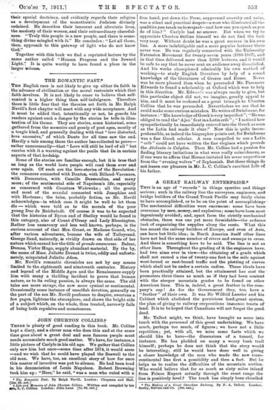THE ROMANTIC PAST.*
THE English race is not likely to give up either its faith in the advance of civilization or the moral restraints which that faith involves. It is not likely to cease to believe that self- control is a higher thing than self-indulgence. Therefore I there is little fear that the theories set forth in Mr. Ralph I Nevill's first chapter will meet with any wide acceptance. And it must be added that, intentionally or not, he guards his readers against such a danger by the stories he tells in illus- tration of his theme. They are stories, some historical, some gathered from the memoirs and gossip of past ages, mostly of la tragic kind, and generally dealing with that "love distorted, love excessive," of which Dante for all time saw the end. frardly a tale among those the author has collected to prove— rather unnecessarily--that "Love will still be lord of all" but carries with it a warning against the perils that lie in eertain aspects of that lordship.
Some of the stories are familiar enough, but it is true that as long as the world lasts people will read them over and over again. Of such are the love-stories of the Revolution: the romances connected with Denton, with Billaud-Varennes, with Dumouriez, with Camille Desmoulins, and many more; of the sentimental side of Napoleon's life, especially as concerned with. Countess Walewska ; all the gossip and most of the scandal connected with Josephine and with Hortense ; the tales, probably fiction, as Mr. Nevill acknowledges—in which case it might be well to let them die — which were told as to the morals of the poor young Dire de Reichstadt. Of course it was to be expected that the histories of Byron and of Shelley would be found in this category, also of Count d'Orsay and Lady Blessington. Rather less unsavoury and less well known, perhaps, is the curious account of that Mrs. Grant, or Madame Grand, who, after various adventures, became the wife of Talley-rand. George Sand, naturally, is vividly drawn on that side of her -nature which earned her the title of gran& amoureuse. Balzac, Dumas, Victor Hugo, supply abundant material By the by, the name of Mme. Juliette Drouet is twice, oddly and unfortu- n,ately, misprinted Juliette Adam.
Mr. Nevill's romantic chronicles are not by any means limited to the eighteenth and nineteenth centuries. History and legend of the Middle Ages and the Renaissance supply him with many a thrilling incident to prove that human nature, as to its ruling passion, is always the same. The old tales are more savage, the new more cynical or sentimental Occasionally some instance of unselfish devotion, generally on the part of the sex Mr. Nevin professes to despise, sweetens a few pages, lightens the atmosphere, and shows the bright side of a subject which, on the whole, thus treated, narrowly fails of being both repulsive and monotonous.






























































 Previous page
Previous page